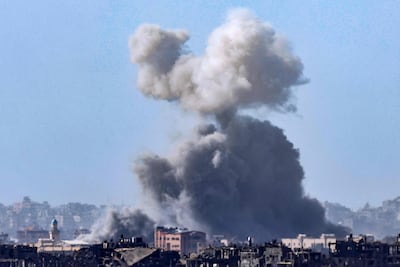Live updates: Follow the latest news on Israel-Gaza
The leaders of Egypt and Qatar, countries mediating the provision of more aid to Gaza and the release of hostages held by Hamas, met in Cairo on Friday to review efforts to de-escalate the month-old war that has devastated the coastal enclave.
The talks between Egyptian President Abdel Fattah El Sisi and Qatar's Emir Sheikh Tamim focused on the protection of civilians and halting the bloodshed in Gaza, where nearly 11,000 people, including more than 4,000 children, have been killed in the relentless Israeli bombardment, the president's office said.
They also reviewed efforts to allow substantial humanitarian supplies to reach Gaza's 2.3 million people.
“The two leaders also emphasised their rejection of any attempt to liquidate the Palestinian cause at the expense of the Palestinian people or countries in the region, as well as forced evictions,” the president's office said.

Their talks came on the eve of an emergency Arab summit in Saudi Arabia to discuss the war, which began after Hamas militants killed more than 1,400 people in southern Israel on October 7 and took about 240 hostages back to Gaza.
The visit by Sheikh Tamim followed a meeting in Doha on Thursday between Qatar's Prime Minister and the chiefs of the US and Israeli spy agencies to discuss the parameters of a deal for the release of hostages in exchange for a pause in Israel's attacks, Reuters reported.
Negotiations also involve the US, Egypt and Hamas, whose political leaders held talks in Cairo on Thursday with Egypt's intelligence chief Gen Abbas Kamel.
Hamas is demanding a three-day truce to allow more humanitarian supplies into Gaza and the departure of injured civilians to Egypt for treatment. But Israel was opposed to an extended truce and preferred to offer intermittent pauses, Egyptian officials said.
The UN said on Thursday that Israel has agreed to daily four-hour pauses in the north of Gaza and the opening of safe corridors for civilians to move south.
Under the proposed deal, the dispatch of larger amounts of relief supplies to Gaza would be co-ordinated by Egypt, which shares a border with Israel and Gaza in the Sinai Peninsula, Egyptian officials said.
Israel has agreed in principle to allow the entry of fuel into Gaza, provided its use is restricted to hospitals and key infrastructure including desalination plants and power stations. It also wants the use of the fuel monitored by the UN and US representatives, Egyptian officials said.
The officials did not know the exact number of the hostages who would be released under the proposed deal, but suggested it could be anywhere between 20 and 50, including US citizens. They would include women, children and elderly people, and would be freed in batches.
Hamas also wants women and children held in Israeli jails to be released under the agreement. The group has also called for steps to ensure Israeli forces inside Gaza are not reinforced or redeployed during the truce.
There has been no official comment from any of the four countries involved in the negotiations, or from Hamas.
Egypt signed a peace treaty with Israel in 1979 and maintains a working relationship with Hamas and other militant groups in Gaza. Like Egypt, Qatar is a close US ally that has relations with Hamas's political leaders. Doha is also home to several of the group's senior political leaders.

